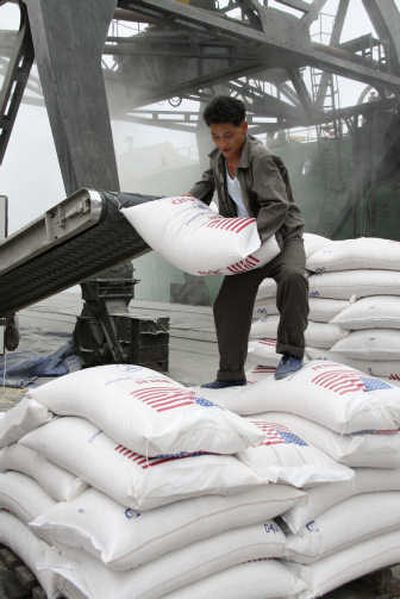Region’s wheat shipped to hungry North Koreans

North Korea – named by President Bush as part of the “Axis of Evil” – has long been a reclusive nation. Now, ravaged by hunger and poverty, its borders are opening to expanded international aid.
Some of that aid is coming from the Inland Northwest, as ships filled with wheat grown on the rolling hills and flat fields of Washington arrived in North Korea this week.
The wheat, purchased by the federal government, is part of a humanitarian effort on behalf of the United States and the international community. It’s enough grain to help feed 5 million people, many of them impoverished and hungry after floods ravaged the reclusive nation’s crops.
Because the country lacks adequate milling facilities, the wheat will be cooked into gruel.
“I’ve never tried it, but it’s my understanding that it’s a kind of porridge that they will eat,” said Tom Mick, chief executive officer of the Washington Grain Alliance.
The shipment is expected to save lives.
“That means a lot to me,” said Hal Johnson, a Reardan-area farmer and chairman of the Washington Wheat Commission, “and I’m sure it means a lot to wheat growers throughout the Northwest.”
The wheat arrived just days after North Korea allegedly exploded a cooling tower at its main nuclear reactor site. The move is expected to erase North Korea from the U.S. State Department’s list of terrorism sponsors.
In the run-up to the Iraq war, Bush demonized North Korea as part of an “Axis of Evil” that also included Iraq and Iran. The country, founded after World War II as a communist state, has been ruled by Kim Jong Il since 1980.
Acquiring wheat had been problematic for the country, which, despite its desire of self-reliance and standing army of 1 million soldiers, has relied heavily upon international food aid since the mid-1990s.
The wheat shipment and future shipments will be administered by the United Nations.
Without the aid, North Korea might not have been able to afford grain shipments. World supplies are tight, and wheat has fetched record high prices during the past year.
The United States has systematically sold its wheat stockpiles to raise cash to buy other commodities for distribution to other countries, Mick said.
The 37,000 metric tons unloaded in the port of Nampo this week represents roughly 1 percent of all the wheat grown annually in Washington.
Mick said farmers don’t appreciate wheat being used as a diplomatic tool; they’d rather just be able to sell wheat freely, without sanctions or trade barriers. “We don’t like it, but it’s a reality,” he said. “I guess in the end farmers just feel good about participating in feeding hungry people.”